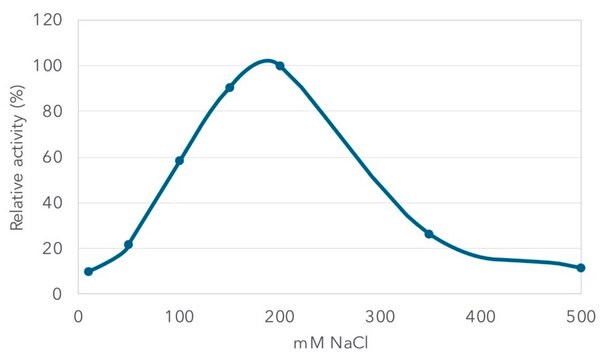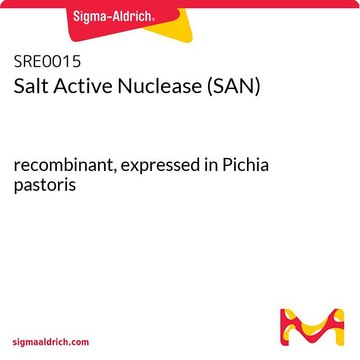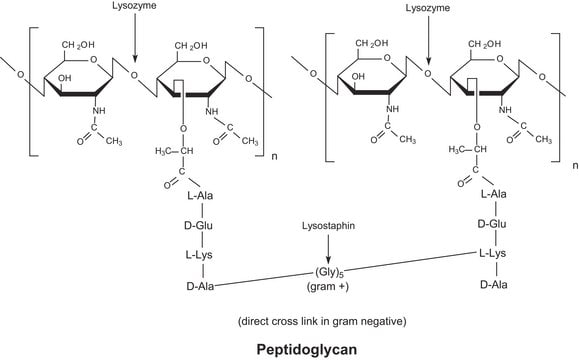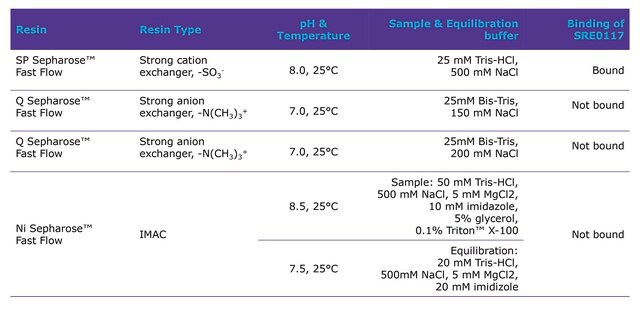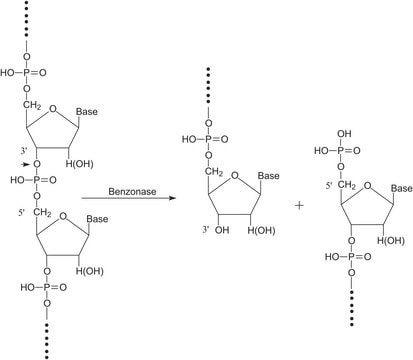推荐产品
一般說明
Nucleic acids, and especially genomic DNA, often pose a problem in purification of DNA-binding proteins as they interfere with purification, downstream analysis or applications. As most nucleases are inhibited by high concentrations of salt, removal of DNA is difficult, since NaCl is used to dissociate DNA from proteins.
This Salt Active Nuclease (SAN) is a nonspecific endonuclease recombinantly produced in Pichia pastoris, with optimum activity at high salt concentrations. It is active in a variety of buffers and can be easily inactivated by treatment with a reducing agent. These features make it particularly useful in the purification of proteins and removal of DNA and RNA from molecular biology reagents. It can be used on cell lysates for viscosity removal, and additionally at the elution step of purification, where there are smaller volumes and a purer protein - allowing for effective and efficient DNA removal.
This Salt Active Nuclease (SAN) is a nonspecific endonuclease recombinantly produced in Pichia pastoris, with optimum activity at high salt concentrations. It is active in a variety of buffers and can be easily inactivated by treatment with a reducing agent. These features make it particularly useful in the purification of proteins and removal of DNA and RNA from molecular biology reagents. It can be used on cell lysates for viscosity removal, and additionally at the elution step of purification, where there are smaller volumes and a purer protein - allowing for effective and efficient DNA removal.
This Salt Active Nuclease (SAN) is a heat-labile nuclease that has optimal activity at high salt concentrations and is useful during protein purification.
應用
The high salt tolerance and easy removal makes this SAN useful in protein purification schemes, especially in combination with IMAC (Immobilized metal affinity chromatography) media used for purification of poly-His-tagged proteins.
特點和優勢
- Active at up to 1M NaCl
Tolerates imidazole and can be separated from most proteins by cation exchange or inactivated by reducing agents.
單位定義
One Unit is defined as an increase in absorbance at 260 nm of 1 A in 30 minutes at 37°C, using 50 μg/ml calf thymus DNA (D1501, Sigma) in a buffer consisting of 25 mM Tris-HCl, pH 8.5 (25°C), 5 mM MgCl2, 500 mM NaCl.
重構
In solution
其他說明
Temp: 5 – 40°C, optimal: ~ 35°C
Salt concentration (NaCI / KCI): 150 - 900 mM, optimal: 400 - 650 mM
Mg2+: >1 mM is required for activity, optimal: 5 - 50 mM
pH: 7.3 – 10, optimal: 8.2 - 9.2
Not recommended to use in presence of SDS or urea.
Salt concentration (NaCI / KCI): 150 - 900 mM, optimal: 400 - 650 mM
Mg2+: >1 mM is required for activity, optimal: 5 - 50 mM
pH: 7.3 – 10, optimal: 8.2 - 9.2
Not recommended to use in presence of SDS or urea.
儲存類別代碼
10 - Combustible liquids
水污染物質分類(WGK)
WGK 2
閃點(°F)
Not applicable
閃點(°C)
Not applicable
我们的科学家团队拥有各种研究领域经验,包括生命科学、材料科学、化学合成、色谱、分析及许多其他领域.
联系技术服务部门